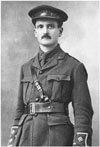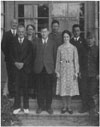INTRODUCTION
Charles Inglis McLaren (1882–1957) was a psychiatrist and missionary from the Presbyterian Church of Australia, and helped to introduce psychiatry to Korea. McLaren's contributions to Korea extended beyond the mere introduction of a discipline, and were largely due to his uniqueness. McLaren was not only a psychiatrist, but also a thinker who thought deeply about Christianity, psychiatry, and the problems of medicine and disease. He also maintained an anti-Japanese attitude, which caused him to be imprisoned and finally expelled at the end of the Japanese occupation. As a psychiatrist, he suffered from manic depression, but was courageous enough to reveal his illness to others. This paper will look at McLaren's life, his contributions to Korean society, and his medical thoughts in his activities and writings.
McLaren's life
McLaren was born on August 23, 1882 in Tsukiji in Tokyo, Japan, the third of Samuel McLaren who was father to another son and three daughters. Samuel McLaren, Scottish missionary, studied law at the University of Edinburgh before studying theology to become a missionary. After graduation, he went to Japan as a missionary. As he had a solid academic foundation, he was appointed as a professor at the Presbyterian Union Theological Seminary, and served as a translator of Japanese Bible translations. In 1883, he took a sabbatical and returned to Scotland, but was unable to go back to Japan for health issues. The McLarens moved to Australia and settled in Melbourne.
McLaren had a strong Christian faith in Australia as a child. While attending Melbourne Medical School, he committed himself to the propagation of Christianity. He signed the Student Volunteer Declaration for world evangelization, and began to realize a missionary dream. He graduated from Melbourne Medical School in 1906. He was a resident medical officer at the (Royal) Melbourne Hospital and worked at the Children's Hospital. In 1910, he received his doctor's degree in medicine. Thanks to working at the Children's Hospital, he was able to teach pediatrics at Severance Union Medical College (SUMC) later.
McLaren was active in the Australian Student Christian Union and the Student Volunteer Movement for Foreign Missions from schooldays, and the Australian Presbyterian Mission decided to send him to Korea in 1910. On August 22, 1911, he married Jessie Reeve (1859–1941), who also participated in the student resource movement and had a dream of mission work, and left for Korea in late September. Mr. and Mrs. McLaren arrived in Busan through Japan on October 30, 1911. They started mission work at Paton Memorial Hospital in Jinju, South Gyeongsang Province. The Paton Memorial Hospital was a mission hospital established in 1905 by the Australian medical missionary Hugh Currell (1871–1943). McLaren initially worked with Currell as the assistant superintendent, and came to work as superintendent of Paton Memorial Hospital in 1915, when Currell returned home.
The Australian Presbyterian Mission was asked to dispatch a doctor as a joint missionary from Severance Hospital and SUMC in 1913, when McLaren was working at Paton Memorial Hospital. Therefore, McLaren went to Seoul to work at Severance Hospital for three months out of the year until he was appointed as a professor of psychiatry at SUMC in 1923, where he taught both pediatrics and psychiatry. Professor McLaren taught juniors pediatrics and it was the first official lecture of pediatrics at SUMC.1 Professor McLaren also made a great contribution to the foundation of ophthalmology in Korea by giving lectures on reflection.
Before McLaren moved from Paton Memorial Hospital to Severance Hospital, he volunteered for World War One in 1917 (Fig. 1). He was shocked by the death of his brother, Bruce McLaren, who was a remarkable mathematical physicist from Cambridge University, on the battlefield and decided to join the war. Although his acquaintances tried to dissuade him from serving in the war, McLaren fought in Europe. He returned to Korea late April in 1920. After returning to Korea, he lectured and saw patients at Paton Memorial Hospital in Jinju and Severance Hospital in Seoul as before. In 1923, he became a full-time director of the psychiatric department at Severance Hospital and served until 1939 (Fig. 2).2 While he was working at Severance Hospital, he nurtured outstanding psychiatrists who led psychiatry in Korea, including Lee Jung-Chul, Nam Myong-Suk, and Kim Rin-Soo.
McLaren went to Australia for his sabbatical year on September 20, 1926 and returned to Severance Hospital a year later. After returning to school in the fall semester of 1927, McLaren went to Vienna in May 1929.3 He arrived in Vienna via Manchuria, Siberia, and Moscow on a train. During his trip, he became critical of communism, as he saw Russians lived difficult lives under the rule of the Soviet Union. Vienna, a city in which he arrived after a long train journey, was economically poor but culturally rich. The Medical University of Vienna, which was a center of western medicine in the previous century, was home to hundreds of doctors from different countries. With many English lectures for foreigners, McLaren studied neurology and psychiatry. At the time, Vienna was leading academics in neurology and psychiatry. Freud, the founder of psychoanalysis, was also in Vienna when McLaren stayed there. McLaren, who focused on psychological treatment from a Christian's point of view, had difficulty fully accepting Freud's psychoanalysis, which emphasized sexual aspects. However, he agreed to Freud's emphasis on a psychological approach rather than a biological approach regarding mental issues. McLaren's writing showed that he accepted thoughts expressed in Freud and Adler's books as much as he could. Because of this tendency, McLaren emphasized psychotherapy. According to some graduates, McLaren often saw a patient for two or three hours.4 Impressed by the academic atmosphere in Vienna, McLaren hoped that other professors and graduates of SUMC would come to Vienna and have the opportunity to do such research.5 In fact, McLaren tried to have his student, Lee Jung-Chul, study in Vienna,6 but circumstances did not allow him to make it happen.
McLaren resigned from SUMC in October 1938. His resignation seemed to be a result of his personal problems, the issue of Severance's school affairs, and the explicit pressure of Japanese imperialism on shrine visiting. After resignation, McLaren stayed in Seoul for a while before going back to Jinju to work at Paton Memorial Hospital. However, McLaren was not only opposed to shrine visitation, but also expressed strong anti-Japanese ideology, which made him the target of Japanese surveillance. With the start of the Pacific War, which broke out on December 8, 1941, Australia became an enemy of Japan, and McLaren was imprisoned. He spent 11 weeks in jail and was deported to Australia on June 2, 1942. He was the last missionary in Korea at the time (Fig. 3).
After returning to Australia, McLaren gave lectures on the situation in Asia, Japan, and Korea, and presented his views on how to maintain peace in the Pacific region. At the end of the war, he campaigned against the White Australia policy, and assisted in missionary activities. He also invited a Korean student to Australia so that he could study there. He died on October 9, 1957, at the age of 75 years.
McLaren's humanitarian medical thoughts
McLaren's perspective on psychiatry can be expressed in many words, but the best word for his perspective is humanitarian. McLaren was very interested in the humanitarian treatment of insane people at the social level. He was deeply saddened by the miserable condition of psychiatric patients in Korea at the time. In 1924, Korea had only one ward, which was operated by the Japanese Government-General of Korea and could accommodate 50 psychiatric patients. Most mental patients were wandering the streets, often mocked by crowds or treated harshly. He believed that it was an urgent task for the psychiatric department at Severance Hospital to establish a psychiatric ward to treat mental patients.
His plan was put into practice after he returned from Vienna. He spurred the construction of a psychiatric ward, which had long been needed for years, and a small psychiatric ward was finally built in 1930. The building was able to accommodate six patients, including three male patients and three female patients, and was equipped with various clinical instruments to allow for education. Although the ward was not large, it was marked as a milestone in the development of psychiatry in Korea. The construction of the ward was aided greatly by a donation from Mrs. Caroline B. Adams from Berkeley, California.7 McLaren paid close attention to making the ward an ideal space for mental patients to be protected and treated as human beings, not just an asylum.
In fact, McLaren's humanitarian thoughts were not limited to psychiatric. He also actively participated in a social work committees supported by various missionary groups. One of the main activities was abolition of licensed prostitution.8 He expressed deep sympathy and compassion for the hard lives of prostitutes, and was greatly angry at the fact that such a system was maintained by law.9 He was also active in creating a haven for women in need.10
As a psychiatrist and missionary, McLaren left a lot of records of deep thoughts about the relationship between the human soul and body and Christian faith and healing. As mentioned earlier, he had a humanitarian attitude toward medicine. His humanitarian attitude was based on Christian universal love for mankind. The fact that his humanitarian attitude was not simply limited to patients can be seen in the fact that he was opposed to the White Australia policy upon returning to Australia. He also took a balanced approach to many issues. For example, regarding the relationship between mind and body, he emphasized the psychological aspects of human beings and did not ignore the biological conditions of human beings. Furthermore, he expressed considerable interests in the interaction of mind and matter. He also believed science and faith were not contradictory. He believed that a passage from the Bible, “Ask, and it shall be given you,” applied to scientific inquiries.
CONCLUSION
Although there were many medical missionaries who worked in Korea before its liberation, McLaren reflected unique aspects. First of all, he was a psychiatrist, which was rare at the time. Among the medical missionaries, he was the only psychiatrist. Next, he wrote many deeply thoughtful writings about the relationship between medicine and Christianity. Most medical missionaries do their activities based on religious motivation. It is difficult to find a medical missionary, like McLaren, who agonized over the meaning of missionary activities by sublimating them in a philosophical dimension. He was imprisoned for disagreeing with Japan's policies during Japanese imperialism and eventually deported. In addition, McLaren laid the foundation for the development of psychiatry in Korea by introducing humanitarian psychiatry to Korea while he was working in the psychiatric department at Severance Hospital. It is hoped that this paper will help people recognize McLaren's contribution to the development of medicine in Korea and his Christian medical thoughts.




 PDF
PDF ePub
ePub Citation
Citation Print
Print





 XML Download
XML Download